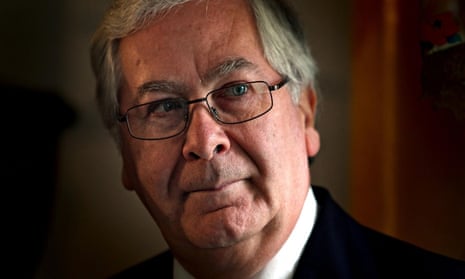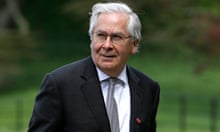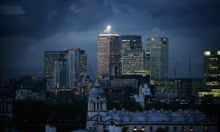The former Bank of England governor Mervyn King has denied that the previous Labour government was responsible for the financial crash, saying there was a shared intellectual responsibility across the political parties and financial institutions for failing to foresee the problems.
Saying his view on the cause of the crisis had evolved, he said he doubted any single one country could have found their way through the crisis.
His remarks on BBC Radio 4’s Today programme, which he was guest-editing, will please the shadow chancellor, Ed Balls, as he prepares to battle a Conservative claim at the next election that Labour mismanagement of City regulation and excessive public spending were jointly responsible for the crash from which the UK economy is still recovering.
In the past King has hinted at select committee sessions that Labour allowed public spending to rise too fast but his latest remarks are one of his clearest exonerations of Labour for the financial crash.
Asked how culpable Labour was, he replied: “I am not going to talk about individual parties’ culpability because I think the real problem was a shared intellectual view right across the entire political spectrum and shared across the financial markets that things were going pretty well.
“There were imbalances – we knew things were unsustainable – but it was not entirely obvious where it would come unstuck – and I think that is something everyone shared, and the right thing is to make it better for the future.”
He added: “I don’t think it is easy to go back and say any one country on its own around the world could have found their way through it. We did talk in the Bank of England about whether we should have had much higher interest rates before the crisis.
“If we had done that we undoubtedly would have had a downturn, probably a recession even, unemployment and inflation well below the target. But we as one country could not have stopped the financial crisis occurring so I think we should have been shooting ourselves in the foot; even if you could argue that if every country had done that it may be we would not have been in such a difficult position.”
He said he did not think the cause of the crisis lay in the regulation itself but “a complete change in psychology and fear in the financial markets about the credit-worthiness of banks”.
“Looking back the leverage of banks was absurdly high and should have been lower. I don’t think there is any point blaming them for it. It came as an enormous surprise to everyone that banks were not creditworthy.”
However, he said he was not sure that policymakers had “yet got to the heart of what went wrong”, and said he was not yet sure the banking system was safe enough.






Comments (…)
Sign in or create your Guardian account to join the discussion